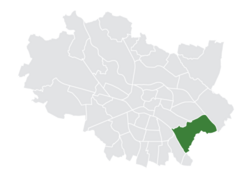Księże (Polish pronunciation: [ˈkɕɛw̃ʐɛ], German: Tschansch, [t͡ʃanʃ]) is a district in Wrocław, Poland, located in the south-eastern part of the city. It was established in the territory of the former Krzyki district.
Księże | |
|---|---|
 | |
 Location of Księże within Wrocław | |
| Country | |
| Voivodeship | Lower Silesian |
| County/City | Wrocław |
| Established | 1991 |
| Population (2022) | |
• Total | 6,379 |
| [1] | |
| Time zone | UTC+1 (CET) |
| • Summer (DST) | UTC+2 (CEST) |
| Area code | +48 71 |
| Website | radaksieze.pl |
The district includes the area of the former villages of Księże Małe, Księże Wielkie, Świątniki, Opatowice, Bierdzany and the settlement of Nowy Dom incorporated within city limits on April 1, 1928.
Name
editThe settlement of Księże Wielkie was first recorded in the mid-12th century under the Latin names of Chenese, Kenese, Sansin, and Czanschin majus. The names Czanschin minus and paruum Czanschyn were used to refer to Księże Małe in the 14th century.[2]
The names of the settlements come from the same root as the modern-day Polish word 'książę' ('prince'), resulting from the fact that the settlements belonged to the prince. Therefore, the original Polish name was Knięże, which later became Księżno and eventually Księże. The phonetically Germanized names of the settlements were Klein Tschansch and Groß Tschansch, which were later changed to Klein and Groß Ohlewiesen ('Oława meadows') during the Nazi era, in order to remove traces of their Polish origin.[2]
For two years after the war, due to misconstruction of medieval records, the settlements of Tschansch were renamed to Mały Ciążyn and Wielki Ciążyn.[2][3] The name was later reverted to Księże. The previous name Ciążyn remains to be used as a proper name of the wastewater catchment plant in the district.[4]
History
editWorks on the modernist neighborhood in Tschansch began in 1924 with the creation of a master plan for Breslau at the City Development Office under the direction of Fritz Behrendt in cooperation with Heinrich Knipping. The final urban planning assumptions for Klein and Groß Tschansch were made in January 1925, followed by the final design of the settlement in Klein Tschansch on April 26, 1928.[2]
In 1991, after reforms in the administrative division of Wrocław, Księże became one of the city's 48 districts.[5]
The district was heavily affected by the 1997 Central European flood.[2]
References
edit- ^ "Liczba mieszkańców zameldowanych we Wrocławiu w podziale na Osiedla – stan na 31 grudnia 2022 r."
- ^ a b c d e "Odkrywamy Wrocław: Modernistyczne osiedle na Księżu Małym". www.tuwroclaw.com (in Polish). Retrieved 2024-01-03.
- ^ "Mały Ciążyn i Wielki Ciążyn, czyli Księże Małe i Księże Wielkie".
- ^ "PRZEBUDOWA POMPOWNI I ZLEWNI ŚCIEKÓW CIĄŻYN". Miejskie Przedsiębiorstwo Wodociągów i Kanalizacji we Wrocławiu (in Polish). Retrieved 2024-02-26.
- ^ "UCHWAŁA NR XX/110/91 RADY MIEJSKIEJ WROCŁAWIA z dnia 20 marca 1991 roku w sprawie podziału Wrocławia na osiedla".